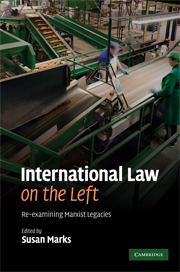Book contents
- Frontmatter
- Contents
- Contributors
- Acknowledgements
- Introduction
- 1 What should international lawyers learn from Karl Marx?
- 2 An outline of a Marxist course on public international law
- 3 The commodity-form theory of international law
- 4 Positivism versus self-determination: the contradictions of Soviet international law
- 5 Marxism and international law: perspectives for the American (twenty-first) century?
- 6 Toward a radical political economy critique of transnational economic law
- 7 Marxian insights for the human rights project
- 8 Marxian embraces (and de-couplings) in Upendra Baxi's human rights scholarship: a case study
- 9 Exploitation as an international legal concept
- Index
6 - Toward a radical political economy critique of transnational economic law
Published online by Cambridge University Press: 07 September 2009
- Frontmatter
- Contents
- Contributors
- Acknowledgements
- Introduction
- 1 What should international lawyers learn from Karl Marx?
- 2 An outline of a Marxist course on public international law
- 3 The commodity-form theory of international law
- 4 Positivism versus self-determination: the contradictions of Soviet international law
- 5 Marxism and international law: perspectives for the American (twenty-first) century?
- 6 Toward a radical political economy critique of transnational economic law
- 7 Marxian insights for the human rights project
- 8 Marxian embraces (and de-couplings) in Upendra Baxi's human rights scholarship: a case study
- 9 Exploitation as an international legal concept
- Index
Summary
[T]he tradition of all the dead generations weighs like a nightmare on the brain of the living. And just when they seem engaged in revolutionising themselves and things, in creating something that has never yet existed, precisely in such epochs of revolutionary crisis they anxiously conjure up the spirits of the past to their service and borrow from them names, battle-cries, and costumes in order to present the new scene of world history in this time-honoured disguise and this borrowed language.
Karl Marx[H]istory is an immanent necessity which finds its justification in the culture, the economic forms, and the ways of living of human society as determined by past developments.
Antonio GramsciIntroduction
This chapter argues that the contemplation of international law on the left in the context of international trade law necessarily implies engaging in a radical political economy critique of transnational economic law in the form of historical materialist analysis. There are two parts to this claim. The first part is that international trade law is best regarded as a form of transnational and not international economic law. The remit of the law of international trade is expanding to include economic relations that touch upon most every dimension of existence and which defy classification as domestic or international, private or public, and local or global. The contemporary trade regime institutionalised in the World Trade Organization (WTO) governs matters that extend well beyond border controls to reach deeply inside the domestic jurisdiction of states.
- Type
- Chapter
- Information
- International Law on the LeftRe-examining Marxist Legacies, pp. 199 - 219Publisher: Cambridge University PressPrint publication year: 2008
- 4
- Cited by



